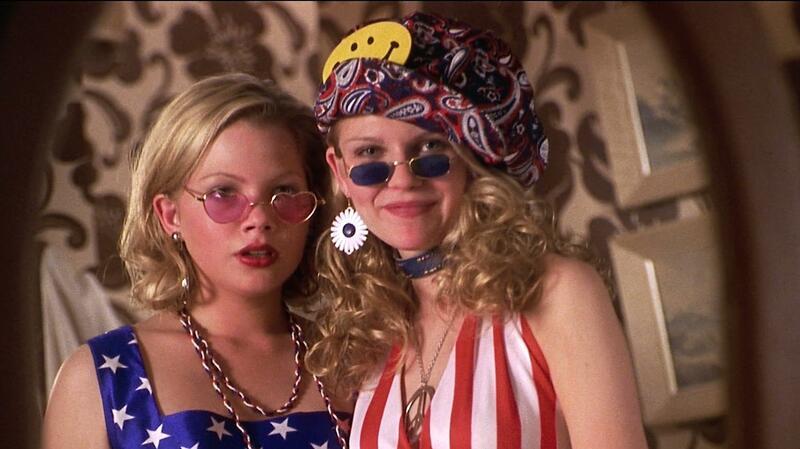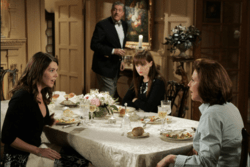1999 Watergate Comedy, "Dick," Teaches Us to Take Teen Girls Seriously
Roughly one year and two million lifetimes ago, climate change activist Greta Thunberg delivered a speech to the UN in New York City. “You have stolen my dreams and my childhood with your empty words,” she stated. “And yet I'm one of the lucky ones. People are suffering. People are dying. Entire ecosystems are collapsing. We are in the beginning of a mass extinction, and all you can talk about is money, and fairy tales of eternal economic growth. How dare you!”
The video of Thunberg’s speech went viral. Hot takes were delivered on cue, the most famous one by President Donald Trump. “Greta must work on her Anger Management problem,” the President tweeted. The so-called leader of the free world started a feud... with a seventeen-year-old girl. Last Thursday, as Biden racked up votes and the President posted angry, inaccurate tweets, Greta Thunberg seized the moment to throw Trump’s dismissal of her own existential rage back in his face. “So ridiculous,” she tweeted. “Donald must work on his Anger Management problem, then go to a good old fashioned movie with a friend! Chill Donald, Chill!”
I wish I could say that I was shocked by Trump’s “rivalry” with Thunberg. But I simply wasn’t. The President has demonstrated over and over again that he has no shame, and will lash out at anyone and anything. What did surprise me was the cold satisfaction I felt when the most powerful man in the country was brazen enough to publicly acknowledge that a teenage girl had threatened his worldview. These two worlds—the presidency and teenage girldom—are not supposed to mix. One is the world of cufflinks and nuclear footballs; the other is the domain of VSCO scrunchies and Tiktok. This is not to say that I was pleased with Trump’s remark—I wasn’t. And I am under no illusions that media attention equals progress. But the story, as trivial as it is, makes me dream of a world where young people’s claim to political agency is viewed as more than a sideshow to adult power.
But I’m not here to talk about Greta Thunberg or Donald Trump. Others can do that job better than I can. No, I am here to do something a little different: dive into the sociopolitical implications of a forgotten movie from 1999 titled Dick.
For those who are not familiar with Dick, it is a light-hearted coming-of-age comedy about the Watergate scandal. The film depicts the adventures of Betsy (Kirsten Dunst) and Arlene (Michelle Williams), fifteen-year-old best friends living in Washington, DC. As it happens, Arlene and her single mother live at the Watergate Hotel complex–a random fact of geography that will change the course of American history. On the fateful evening of June 17, 1972, Arlene and Betsy, fresh from a late-night excursion to mail a letter to teen idol Bobby Sherman, come face-to-face with the lead burglar, G. Gordon Liddy. President Nixon (Dan Hedaya) attempts to coddle the girls into silence by making them “official” White House dog walkers for presidential pet Checkers. For a while, the girls take the bait, but they soon awaken to the corruption in their midst, eventually becoming pivotal sources for Robert Woodward and Carl Bernstein, the journalists investigating the break-in; when asked who they are, the girls pick the pseudonym “Deep Throat,” the title of the popular 1973 pornographic film enjoyed by Betsy’s pothead brother. Hijinks ensue; Nixon resigns; the girls celebrate their victory by opening a disco-themed roller rink. The end.
If that summary reads like a garbled, incomprehensible mess to you, well, you would be correct! Though the movie features fine performances from Williams, Dunst, and a pitch-perfect Hedaya, Dick is all over the place tonally and thematically. Unfunny gags are painfully drawn out, while interesting threads are quickly abandoned. And—perhaps unsurprisingly—the true legacy of the actual film Deep Throat is completely ignored. As we now know, star Linda Lovelace was coerced into appearing in the film by her sexually abusive husband. She later became an activist in the anti-pornography movement alongside feminists like Gloria Steinem and Andrea Dworkin.
The fact that Andrea Dworkin doesn’t make a cameo is probably for the best. While the film hints from time to time at a deeper social commentary and a coherent political outlook, any attempt to explore these topics recedes under the fog of seventies nostalgia, sketch comedy shtick and, uh, dick jokes. Consequently, the particulars of most of the movie’s set pieces have completely disappeared from my memory. However, one scene stands out as the exception.
Toward the end of the film, Betsy and Arlene meet with Woodward and Bernstein in a subterranean garage. After handing over their information to the reporters, the girls ask if their names will be revealed.
“No,” the two men say.
“To protect our identities?” the girls ask.
“It’s just too embarrassing,” the journalists reply.
By this point in the film, Betsy and Arlene have had their phones tapped, been followed and chased by mysterious vans, and have gone to great lengths to retrieve the information that will bring Nixon down. But, as they are reminded here, their status as teenage girls means that their heroic actions don’t make them citizens worthy of public commendation, or even acknowledgement. The country has benefited from their whistleblowing, but the pride of the male journalists—and the pride of the system they represent—is more important.
It is a bitter irony in our society that the people most likely to suffer from forces like climate change have the least power to change their circumstances. The younger you are, the bleaker the outcomes. Add elements like gender, race, and class to the mix, and you’ve got an even scarier script for the future.
In the film, Arlene and Betsy beat the bully, restore decency, and return to a life of carefree fun. Most of today’s youth have no such luxury. We now know that the rot that characterized the Nixon administration never went away—that corruption and cruelty has been left to fester in the White House and in other halls of power for decades. Unlike the teenagers of 1972, we may not even have a future in which sinking into a chair to laugh at our youthful naivete is an option. Forget about movies—will our democratic norms exist in thirty years? What about coastal cities, or arable farmland?
Dick offers viewers an escape from our current circumstances, but it also contains kernels of truth about the generational divide in America and the erosion of our democracy. There is no disco roller rink waiting for us on the other side of this presidency. But, if we work hard, embarrass the right people, and remember that there’s nothing embarrassing about teenage girls participating in civic life, we may live to fight another day.







